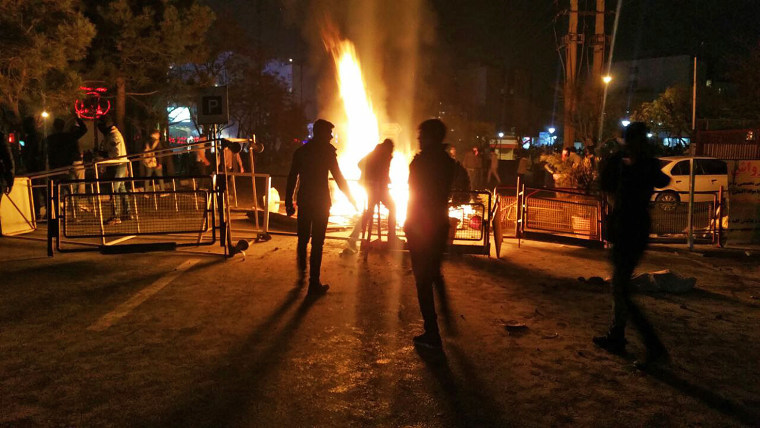WASHINGTON — The Iranian government appears to have contained the civil unrest across that country so far, but the protests could still evolve into a serious threat to the regime, current and former intelligence officials told NBC News.
"At this moment, the government appears to have this under control — this is discontent, not revolution," said a former senior intelligence official with long Middle East experience, after Iran was roiled by a sixth day of anti-government protests in more than 70 cities. The protests are both large and small, according to one official, who said that in some cities, demonstrators can be counted on one hand.
"People so far are moving away from something — the status quo — but not embracing something else, revolution," said the former official.
The former official added, however, that "the social contract is stained, the regime is embarrassed."
"The protests are symptomatic of longstanding grievances that have been left to fester by Tehran," said a current official. "The Iranian government faces a crossroads."
The current and former officials said the protests were different in character and scope from the bloody unrest that roiled the country in 2009, which police and paramilitary Basij suppressed with batons, pepper spray, sticks and firearms. Among those shot and killed was Neda Agha-Soltan, whose final moments were uploaded to YouTube and viewed around the world.
More than 20 people are reported to have died in the current protests, but there have been no reports of a widespread, violent crackdown by the government.
The 2009 protests came in the wake of a disputed presidential election in which hardline President Mahmoud Ahmadinejad claimed an overwhelming re-election victory. Today's unrest is more about economic grievances, analysts say, and Iran is run by a more moderate president, Hassan Rouhani, who reacted to the demonstrations by saying that people are free to protest and criticize the government.
A current U.S. intelligence official said the current protests have been "widespread, but turnout has not yet reached the size of the 2009 protests."
Another reason cited for the lack of a greater government response is that the protests have moved so fast, starting on Thursday and moving to the capital on the weekend.

"How forcefully security organs are prepared to respond remains an open question," said a current U.S. official.
Iran's Supreme Leader Ali Khamenei took a different tack, blaming the protests on foreign intelligence agents.
And in a letter to the UN, Iran’s ambassador to the UN denounced “the most recent and wide-ranging attempts by the Government of the United States to intervene in the domestic affairs of the Islamic Republic of Iran.”
“The President and Vice-President of the United States, in their numerous absurd tweets, incited Iranians to engage in disruptive acts,” said Gholamali Khoshroo.
Current intelligence officials declined to comment on whether the U.S. has or is playing any role in assisting the protesters. Among former CIA officers, some suggested the U.S. did not have the capacity to gin up unrest in Iran, while others said they would not rule it out.
"The Israelis have a longstanding and broad network in the country, and we learned that in Egypt it wouldn't really take that much," said one former intelligence officer with long experience working on Iran, meaning that the Egyptian protests spread rapidly, not that the CIA had anything to do with them. "The idea that it couldn't be helped along, I would dispute that."
"We have the capacity to help keep the internet on. Particularly along the borders we can beam capability in," the former officer added. "That's what I would be doing right now. This is something I would try to aid in anyway way that we could."
The Iranian government has sought to slow down the internet, according to sources in the region, but it has not been able to disrupt access altogether.
The former senior intelligence official noted that in 2009 there were only about a million mobile phones in Iran. Now, the number is approaching 50 million, he said, and there has been a proliferation of apps that people can use to communicate outside of government monitoring, including Telegram.
One danger for the regime, said the former senior official, is that in trying to tamp down demonstrations, it will overreact and further inflame the situation.
"Many of those units sent to the cities will not be 'A' team, but 'B' and 'C' team … leaving open the possibility of an overreaction worsening the situation," the former official said, adding that an operation to tamp down demonstrations is "a massive architecture that is going to be difficult to organize, maintain, etc."
The former intelligence officer who had worked on Iran said he hoped the Trump administration would cool its public rhetoric, because any notion that the West is interfering is unhelpful.
He added that these protests could ultimately threaten the regime.
"This is the type of thing that can go beyond their control," he said. "If they don't think their lives are at risk, the military aren't going to shoot civilians. And so if you hit a tipping point and they haven't gotten ahead of it, that's when things can get interesting."
Amir Fakhravar, an Iranian dissident in the U.S. with ties to the protest movement, told NBC News that he does not believe the government will be able to contain the unrest.
"These are people who want to change the entire structure of the regime," he said. "It's all over the country."


